
CET1172C Students Home Page - Main Links
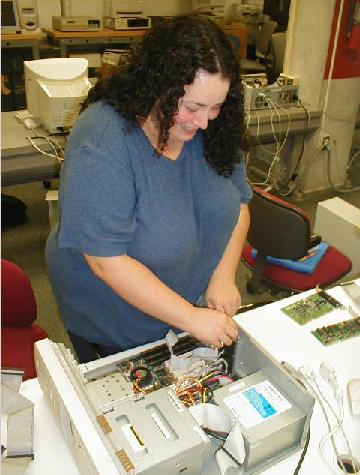
Student busy disassembling a PC
All practice tests are now available from this portal.
Only attempt one after all it's modules have been covered!
Online Practice Test Portal
CET1172C General Description
COURSE DESCRIPTION: This course is an in-depth study of the IBM AT/ATX family of microcomputers with an emphasis on preparing the student with the knowledge and skills to be able to troubleshoot, repair, upgrade, and maintain them. The coverage will include microcomputer construction and the function of each component. The class will also include a foundation for preparation for the industry standard CompTIA A+ certification. (This is NOT a "paper certification" exam cram class, the student will work on actual PC's in the classroom environment.)
Students can start the program with CET1171 - Introduction to Microcomputer Service and Maintenance, an 8 week course that starts August 29 and will end October 24. Students can also immediately enroll in CET1172C which runs from October 25 to December 21. In the January semester students can enroll in CET2176C in the first 8 weeks, and CET1173C in the second 8 week mini-term and be done with the classes by May. Students may take the EET1082 during the Fall or the Spring (Jan. 2008) semesters during the 8 week mini-term or full 16 week term in which it is offered. Upon successful completion of the five classes, the student will earn the Microcomputer Repairer/installer Certificate from Miami-Dade College and have received valuable training toward the CompTIA A+ Certification as well as their Network+ and Server+ certifications.
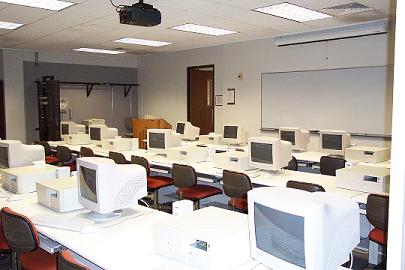
The Microcomputer Repair Program electronic classroom.
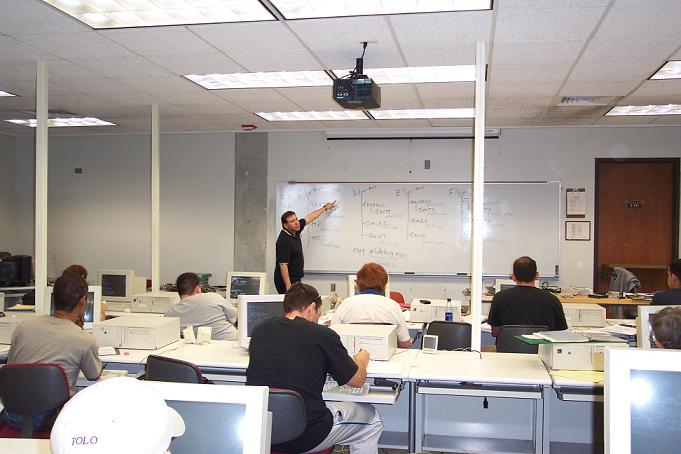
Prof. Calixto teaching the Network+ Certification course.
Getting Started in CET1172C
The first class for the Microcomputer Repairer/Installer Certification Program is CET1171 - Introduction to Microcomputer Service and Maintenance. While the class is considered a "gentle" introduction for students not intending to become professional technicians, it does lay a solid foundation and covers some introductory topics for students intending to go on to completing a certification. As such, it is highly recommended that students considering becoming professional technicians take CET1171 before attempting CET1172C.
As a college credit class, new students need to apply for admission to the college, but you do NOT have to apply as a "degree seeking" student. For more information and assistance on getting into the classes for the upcoming Spring semester do not hesitate to contact the program leader, the instructor or the departmental advisor on how to proceed, or you can stop by the MDC Kendall campus located at 11011 SW 104St Miami, FL and go to Building 3 ground floor Window #1 and apply for admission as a "COLLEGE CREDIT CERTIFICATE SEEKING" student and sign up immediately for CET1171: Mornings: Reference #(TBA) or Evenings Reference #(TBA)
General information for the SPRING 2008 Semester
Textbook:
A+ Guide to Managing and Maintaining Your PC, 5th Ed. By Jean Andrews
ISBN:0-619-21324-8
Recommended Reading:
How Computers Work, 6th Ed. By Ron White and Timothy Downs ISBN:0789725495
Upgrading and Repairing PC's, 17th Ed. By Scott Mueller ISBN:0789734044
Pocket PCRef, 12th Ed. By Thomas Glover & Millie Young ISBN:1885071388
Required:
Toolkit with #2 Phillips screwdriver
Anti-static (ESD) wrist strap
Digital Multimeter (Capable of measuring VDC, mA, Ohms)
Standard molex connector internal power cable extender
Wire Stripper/Crimper
Set of blade disconnect male and female wire crimps
Class Grade Computation:
The final grade for the class will be based on the following:
ITEM POINTS SCORE
ATTENDANCE + Daily Quiz:
3 pts/class X 16 classes = 48 + 2 free points
Worth up to 50 pts
(Daily quiz scores may be included in the attendance grade)
FINAL EXAM Part #1 (Written): Fundamental Computer Concepts and
Terminology; Safety and ESD; Computer Basics;
Hardware Identification; Personal Computer History,
Terminology and Design; Basic Computer Operations
Worth 25 pts
FINAL EXAM Part #2 (Practical): Technical Skills
Computer Disassembly, Component Inventory,
Reassembly, CMOS Configuration, Hard Drive Setup
Worth 25 pts
TOTAL: 100 pts
CET1172C Course Objectives and Coverage
Course Skills & Objectives:
Students shall learn to assemble and disassemble multimedia computers and troubleshoot all components; perform advanced maintenance and servicing of computers; develop their troubleshooting skills; learn to use various advanced tools; download drivers and obtain tech support on the Internet; complete a Technical Notebook.
Coverage:
Students will assemble multimedia computers with CD-ROM drives, sound cards, pointing devices, and network cards and their device drivers; examine, allocate and resolve system resources including IRQs, DMAs and I/O Addresses; learn the usage of various advanced troublshooting tools including the digital multimeter and the POST Error Diagnostic card; perform comprehensive hardware troubleshooting; and find drivers and technical support on the Internet.
Lecture #1: IRQ's - Define and describe the functionality of the Interrupt Requests within the PC, etc
Lecture #2: External Ports - Define and describe the standard external peripheral expansion bus interfaces and buses including serial, parallel, USB and FireWire, etc.
Lecture #3: I/O Addresses - define and describe the functionality of the I/O address as a system resource, etc.
Lecture #4: DMA's - define and describe the functionality of the DMA as a system resource, etc.
Lecture #5: CPU's - continue building a complete understanding of the microprocessor that began in CET1171, list and describe features of the Pentium processors from the first Pentium to the latest Core 2 Duo and Extreme Editions, etc.
Lecture #6: Video Controllers - define and describe how the video controller and the display work, etc.
Lecture #7: CPU Form Factors - Define and describe the form factors and mounting systems of the CPU from the 8088 to the latest Socket T LGA775 based systems, etc.
Lecture #8: Troubleshooting Startup - Develop a foundational troubleshooting hierarchical approach to determining the cause for a system startup failure, etc.
Lecture #9: Troubleshooting the "Dead" PC - Develop a foundational troubleshooting hierarchical approach for determining the cause for a system to fail with no output to the display, etc.
Lecture #10: Motherboard Form Factors - define and describe the motherboard form factors from the original IBM AT to the latest variations of the ATX form factors, etc.
Lecture #11: Using the Digital Multimeter - define and describe electrical units of measure and their properties, describe the usage of the DMM to measure these units and the usages of the DMM to the PC repair technician, etc.
Lecture #12: ATA Controllers and HDD Translations - define the ATA controller and cover its evolution through the seven specifications of the parallel ATA through the two specifications of Serial ATA, define and descibe some highlight BIOS solutions to overcoming the inherent limitation to accessing large hard drives, etc.
Lecture #13: Optical Storage Technologies - Define and describe the priniciples and functionality of Compact Disc and Digital Versatile Disc storage technologies implemented in the PC, etc.
Lecture #14: Introduction to Laptops - Define and describe portable PC's and their associated technologies including technologies that emerged in the protables that have become standard in the desktops, etc.
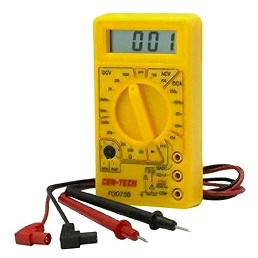
Digital multimeter
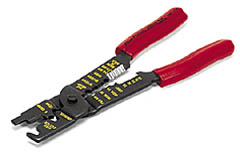
Wire Crimper Tool
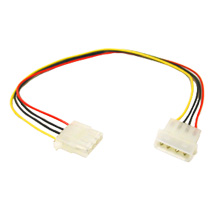
Internal standard molex connector drive power extension